NASHVILLE, Tennessee – A much-anticipated vote by the full Tennessee House of Representatives on Governor Bill Lee’s Education Savings Account (ESA) initiative ended in high drama on Tuesday, after it was moved from the second item on the agenda of the Regular Calendar to the end.
From the outset of the meeting there were three to four dozen opponents to the ESA legislation in the gallery, most of whom were displaying hand-held no vouchers signs.
While there were 13 amendments to the bill proposed in the House, Amendment #1, #3 and #4 were withdrawn and Amendment #2 was rolled to the heel of the amendments.
The remaining amendments were largely offered by Democrats attempting to curtail the legislation.
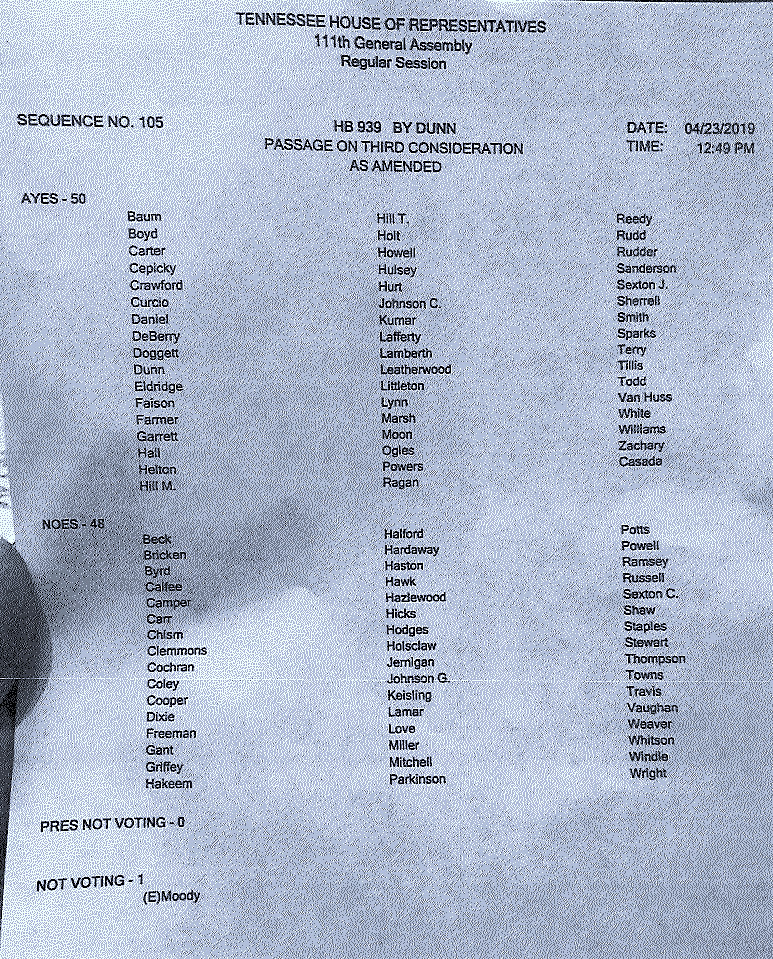 For instance, Representative Jason Powell (D-Nashville) with Amendment #5 sought to allow his county of Davidson to opt out of the legislation, saying not one of the delegation supports it. Powell questioned the constitutionality of the bill and said that the funding of Davidson County schools is under attack.
For instance, Representative Jason Powell (D-Nashville) with Amendment #5 sought to allow his county of Davidson to opt out of the legislation, saying not one of the delegation supports it. Powell questioned the constitutionality of the bill and said that the funding of Davidson County schools is under attack.
“Maybe some of you are fine with the redistribution of wealth,” argued Powell of the amendment he said would shift money to other counties, “but I stand against that.”
Powell said that the result for Davidson County will be a property tax for Davidson County to fund schools.
This claim, despite the fact that Metro Council Member told The Tennessee Star that the city is broke.
Majority Leader William Lamberth (R-Portland) rose, stating that there is so much he could say in response.
Lamberth first reminded that there has absolutely been an investment in education, literally billions of dollars. Among numerous other points, Lamberth went on to mention, as seen in the news reports, the debacle of poor administration, poor leadership and absolutely horrendous results in Davidson County Public Schools, a situation, Lambeth said, that has gone on year after year after year.
Amendment #6 was from Representative Dwayne Thompson (D-Memphis), who wanted to exempt Shelby County Schools.
At this point in the debate, the House floor was remarkably quiet and still, with most members sitting at their desks.
Representative Antonio Parkinson (D-Memphis) asked for his Amendment #7 to be rolled to the heel.
The sponsor of Amendment #8, Representative Bill Beck (D-Nashville), was not there so Democratic Caucus Chair Mike Stewart (D-Nashville) withdrew.
Amendment #9 came from Representative Bo Mitchell (D-Nashville) which, he said, is a small attempt to take some of “the fraud that’s going to be rampant in this program.” Seemingly, parents who move their children from public schools to a private school with the help of ESA funds will be more likely to commit fraud by spending money on bass boats, big screen TV, and no telling what else, so Mitchell’s amendment would require parents to submit their income tax return on an annual basis.
Mitchell said his was an attempt to put “guardrails” on the program, adding that “we like to put guardrails,” perhaps alluding to the same term used in describing the legislation related to citizen oversight boards that came as a response to Nashville’s recent establishment of one.
As Mitchell continued to speculate on what could happen in small communities if one bad school came in, Speaker Glen Casada (R-Franklin) gaveled and told Mitchell to stay on the amendment twice and finally cut off Mitchell.
Amendment #10 by Minority Leader Karen Camper (D-Memphis) was withdrawn.
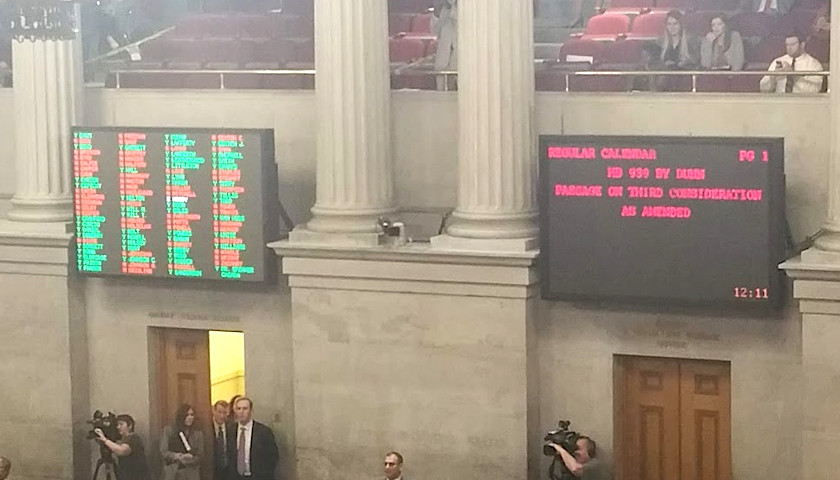
Representative Tom Leatherwood (R-Arlington), who had to be won over on ESAs in Committee, offered Amendment #11, which he said does two things to make it a stronger bill and a better bill, in his opinion.
The first thing the amendment does is to revert to the original limit of 15,000 participating students from the current 30,000.
The second thing Leatherwood’s amendment does is take a first step toward testing parity between the public schools and the participating schools by adding science and social studies testing on an alternating basis to the math and English language arts already required.
Amendment #11 was adopted with a vote of 66 Ayes, 24 Noes and 3 Present Not Voting.
Representative Bryan Terry’s (R-Murfreesboro) Amendment #12 was rolled to the heel of amendments.
While he said it is no secret that he is strongly opposed to the legislation, Representative John Ray Clemmons (D-Nashville) offered Amendment #13 in order to make some necessary changes to it. Those changes included what districts the legislation would apply to, makes the covered expenses more restrictive and returns the funds for a student who left the ESA program back to the LEA to which the student returned.
Other than Amendment #11, Lamberth made a motion to table each of the amendments which were voted on individually. All were tabled by a margin of about two to one with less than a handful Present and Not Voting.
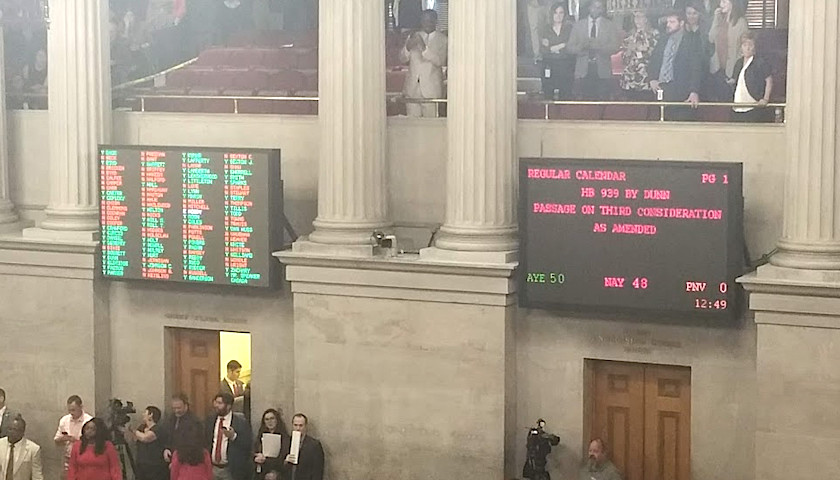
Amendment #2 was adopted without discussion, which lead to Representative Parkinson’s Amendment #7 that would require that the parent of an eligible student provide proof of completed financial literacy training.
Given the numerous and high dollar-value reports of TennCare fraud of as many as 3,077 cases and more than $3 million being repaid to the program, as reported by The Star, similar training may be needed for TennCare recipients.
Since it would generate a fiscal note and require sending it back to Finance, Ways & Means Committee, Lamberth made a motion to table the amendment to keep the bill moving forward.
Parkinson challenged that it would generate a fiscal note, but the vote proceeded and the amendment as tabled.
Before returning from a brief recess, Lamberth explained that the bill was going to be put in a proper posture before voting on it. He also made a correction to his statement about the fiscal note on Parkinson’s amendment, saying that it wouldn’t have changed the motion, just the reasoning.
Representative Terry’s amendment he said is “friendly,” having been discussed with the Speaker, leadership and the Governor. It states simply, “An education savings account is a state or local public benefit,” thereby making illegal immigrants ineligible for the program. Amendment #12 was adopted by voice vote.
The bill, with Amendments #2, 11 and 12 having been adopted, was presented in its entirety by Speaker Pro Tem Bill Dunn (R-Knoxville), who carried the bill after years of being a champion on the issue. Carrying the legislation on behalf of the Governor is what Dunn called an honor. Dunn said Governor Lee used his heart from personal experience seeing what a difference it makes when a child is given the opportunity to have a different educational experience, and he also used his head to make sure it is going to work.
Dunn offered several reasons that school choice is beneficial, including a financial one for the Local Education Agency (LEA). Dunn explained a portion of the money already spent will go with the student and a portion will remain with the LEA.
For example, said Dunn, in Nashville it seems there’s about a $12,000 investment in a child. The portion that would go in an ESA is $8,097 while $3,833 would be left behind for the Davidson County LEA. “Anyway you do the math,” explained Dunn, “that is more dollars per student for that LEA.”
In addition to this funding that will go on forever, there will also be additional funding to help with priority schools.
“The choice is simple,” posed Dunn, “is it better for a bureaucrat to pick a child’s education environment, or should a parent.”

Following Dunn’s presentation of the bill, the first to be recognized by Speaker Casada was Representative Parkinson.
For the record, Parkinson said that “We do not like this bill for Shelby County, so that all the members know implicitly.” Rather, said Parkinson, ‘We feel that this bill is putting something on Shelby County that most of the members in this body don’t want for their own districts.” He went on that if it’s not good enough for your child, then it’s not good enough for ours either.
In actuality, Representatives Mark White (R-Memphis) and Leatherwood, both of whom cover portions of Shelby County, support the legislation.
Parkinson went on to discuss the “love-hate relationship” he has with the ESA bill.
Once this bill passes into law, schools that have not been traditionally accepted based on “perceived Tennessee values” will be eligible for vouchers of $8,097 per student solely for LGBTQ students that has 1,000 students could receive $8,097,000, speculated Parkinson.
Dunn responded that the Department of Education would have to approve the school.
Parkinson went on to inquire whether a school focused on satanic worship, dark arts or witchcraft or one that focused on the teachings of Islam would be eligible.
Dunn responded telling Parkinson, “You could ask the question, what if there’s a school where over 95 percent of the kids cannot read. Would dollars to go it? This isn’t fantasy. This isn’t thinking up things to make points on the floor. This is a reality to some of these students. That they do go to a school where 95 percent of the children cannot read. And I think they deserve an opportunity to have a different educational experience.”
Speaker Casada then offered a reminder that House members have 15 minutes to speak and that Parkinson had about 5 seconds remaining.
Parkinson wrapped up by asking if illegal immigrants would be excluded, to which Dunn said that there are identification requirements that would one would have to be here legally to obtain.
Representative Michael Curcio (R-Dickson), over the course of several minutes, relayed the personal experience of his wife as a teacher, which seemed to inform his position of supporting the ESA initiative.
Opposing the legislation was Representative Johnny Shaw (D-Bolivar), because the 18 years he has been in the legislature, “we’ve been fixing schools.” Shaw mainly concluded about funding, “Until we put it in the right place and do the right thing, the end results won’t be different than other things started in years past.”
Also rising and speaking in opposition to the ESA legislation were Yusuf Hakeem (D-Chattanooga), Jason Potts (D-Nashville), Jason Hodges (D-Clarksville), Karen Camper (D-Memphis) Joe Towns (D-Memphis), and Patsy Hazlewood (R-Signal Mountain).
Speaking in favor of the bill were Representatives “Doc” Kumar (R-Springfield), Robin Smith (R-Hixson), Rick Tillis (R-Lewisburg), Mark White (R-Memphis), Andy Holt (R-Dresden), Matthew Hill (R-Jonesborough, Chris Todd (R-Madison County) and John Ragan (R-Oak Ridge).
While the reasons for supporting the bill were many and widely varying, the opposition was primarily focused on money.
After about two and a quarter hours, the question was called for which requires a two-thirds vote to end debate and proceed to voting on the bill as amended. That motion failed by a vote of 61 Ayes and 36 Nays. Yet, about 10 minutes later, another call for the question resulted in 70 Ayes and 20 Nays.
One minute after that, the vote results on the amended bill, HB 0939, displayed on the board showed a 49 to 49 tie, which meant that the bill failed to reach a constitutional majority of 50 votes. There was an awkward, at best, pause in the action and no count of the vote taken.
Very quickly, there were repeated shouts of “take the vote.”
After a moment, Speaker Casada asked Leader Ron Gant (R-Rossville) to come up to the dias. Shortly thereafter, the dias was vacated.
About this same time, several dozen students on a field trip from Crossroads Christian Academy – a homeschool co-op located in Lenoir City, Tennessee – and accompanied by a few teachers, by chance entered the House gallery. As they spoke to an observer who was in favor of ESAs, they learned more, became interested and wanted to show their support for the measure.
The teachers, improvising, tore apart packets of printed, stapled papers and began writing “YES” and “YES Vouchers” on the back side. The students approached the railing and enthusiastically displayed their impromptu signs of support to House members beside those opposing vouchers.
After nearly 40 minutes, very unceremoniously, the vote was taken which resulted in a vote of 50 Ayes and 48 Nays. As reported by The Star in a breaking news report, the tie was broken by Representative Jason Zachary (R-Knoxville), who changed his vote from No to Aye.
Zachary later explained his vote in a video via Twitter:
Update on my ESA vote….
Knox County is out, held fiscally harmless and our teachers get their raises! pic.twitter.com/K583kzdE5u— Rep. Jason Zachary (@JasonZacharyTN) April 23, 2019
After the vote, Minority Caucus Chair Mike Stewart called a point of order stating that the way the rules read, there are two ways to take a vote in the Chamber. The vote can be done with the Speaker calling the member by name, or the vote can be taken on the electronic board.
Said Stewart, with his glasses off and using them to point,
Implicit in that is when people vote and they cast their votes, the vote is supposed to be taken. What just happened today is a violation of the rules and probably undermines the constitutionality of the vote that was finally just taken after this enormous delay. I want to get that on the record. It’s an improper vote and that’s an invalid passage of a bill.
However, the Permanent Rules of Order of the Tennessee House of Representatives, 111th General Assembly, Rule 31 “Change of Vote” states, in part:
Any member’s vote on a roll call vote may be changed if such member requests such change before the result of the roll call is announced by the Speaker. After the result of the roll call is announced by the Speaker, no member may change such vote and the Journal entry shall not be altered.
Meanwhile, the Senate version of the bill, SB 0795, was recommended for passage by the Finance, Ways and Means Committee and placed on the Senate Regular Calendar for Thursday, April 25.
As the bills of the two bodies are different at this point, it is likely that a conference committee will be required to reconcile the differences.
Details on the bill, amendments, votes and video can be found here.
– – –
Laura Baigert is a senior reporter at The Tennessee Star.
Photo “Jason Zachary” by Jason Zachary.

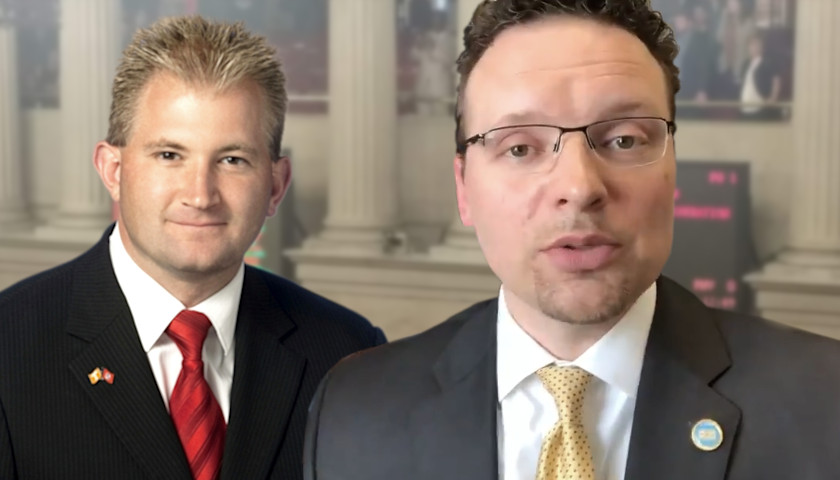


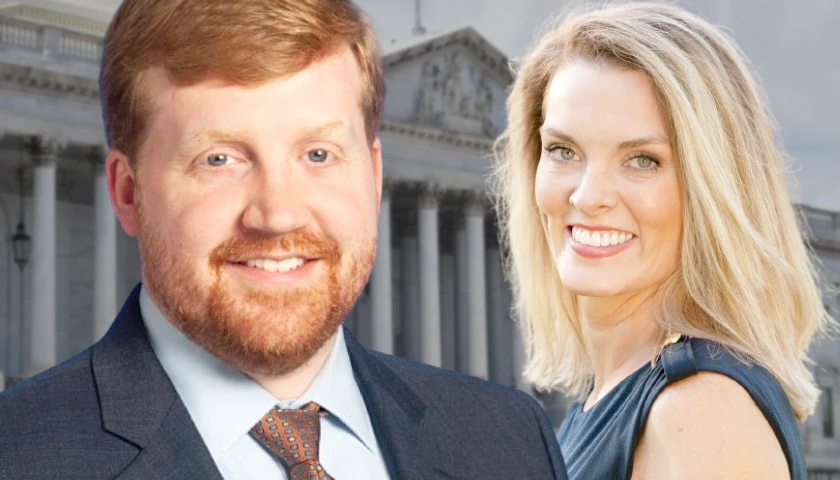
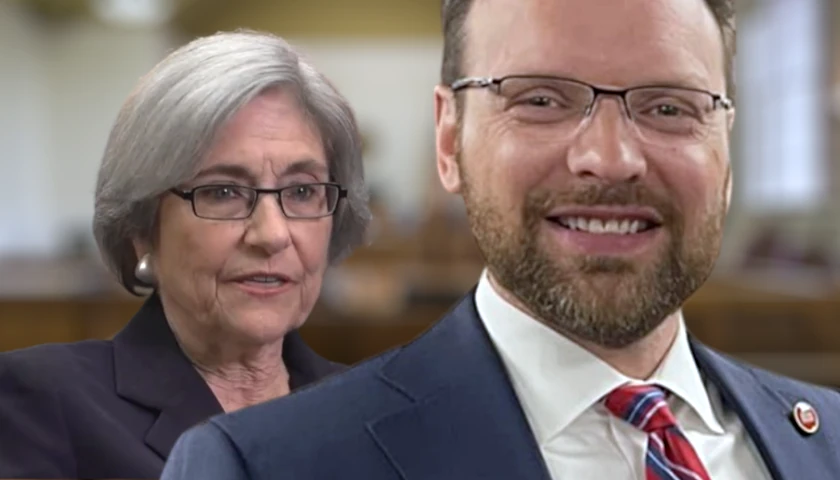
[…] on the House floor, though, was drama filled as a 40-minute pause was taken in order to break a 49 to 49 tie by flipping the vote of […]
[…] by one vote after a dramatic 40-minute delay to break a 49 to 49 tie to end in a 50 to 48 vote, as reported by The Tennessee Star. The tie was broken by Representative Jason Zachary (R-Knoxville), after Knox […]
[…] Tennessee Star reported on Tuesday’s dramatic vote by the State House to approve Gov. Bill Lee’s Education Savings […]
Only 15,000 possible voluntarily taking advantage of this out of 1,000,000 K-12 public school students , which are only allowed in four or five districts, and the Democrats act like it is breaking their backs. THEY STILL GET MONEY FOR NOTHING FOR THESE KIDS THAT ESCAPE. Nobody will be forcing them to leave either. So if Memphis and Davidson schools are so great for the poor, non-white kids, then they have nothing to worry about.
“He went on that if it’s not good enough for your child, then it’s not good enough for ours either.” That is why the bill is unconstitutional on 14th amendment grounds – it only allows a max of 1.5% of the students any choice – except to pay twice.
Thanks to Rep. Terry for culling the illegal immigrants out. The vouchers contain local and state funding, with the federal portion still going to the public schools FOR DOING NOTHING. No legislating-from-the-bench Supreme Court to force redistribution of that state/local wealth to illegals like it is currently done.
“Parkinson went on to inquire whether a school focused on satanic worship, dark arts or witchcraft or one that focused on the teachings of Islam would be eligible.”
I guess he isn’t familiar with Tennessee’s plagiarized social studies standards we copied from California circa 1998. His schools are doing that all the time.
A baby step in the right direction.